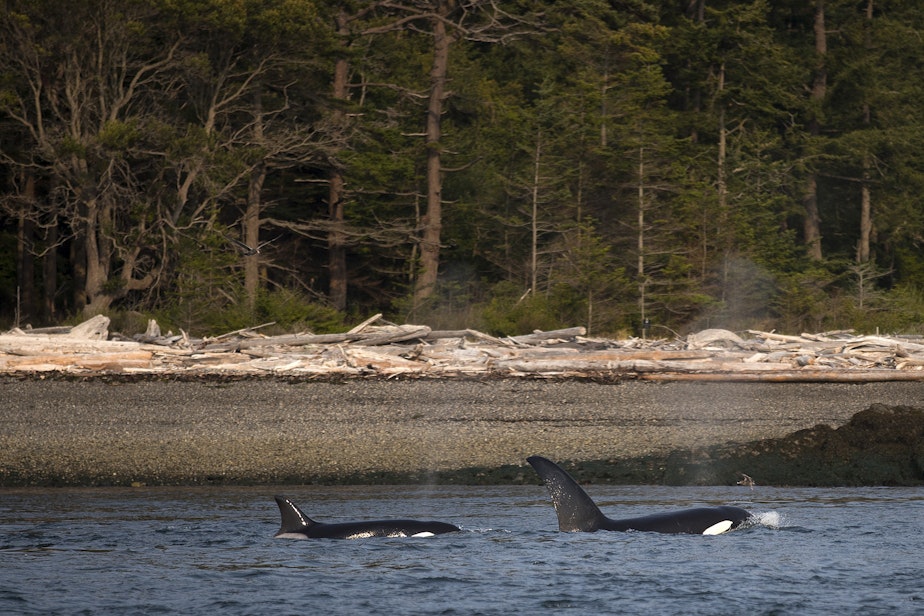Call this 'Year of the Environment' at Washington Legislature (except for orcas)

The state Legislature is at the finish line after big decisions on clean energy, education and the measles. The Seattle Channel's Joni Balter and Q13 political analyst C.R. Douglas recap the session with KUOW's Patricia Murphy.
Patricia Murphy: Joni, put a headline on this year's session for us.
Joni Balter: The environmental session I think is one way you would refer to it. Four different bills, including 100 percent clean electricity. With so many of these bills, the state’s pledges are aspirational. This one actually has teeth. And if you combine it with the three other bills you really do have maybe the most important environmental legislation in a generation.
C.R. Douglas: This is the non-acrimonious Legislature. It's the first time really the Democrats have been firmly in control of both houses since Jay Inslee became governor. Yes there have been debates, but there isn't the bitter drawn-out feuds that we've seen in the last several sessions. They've gone into double overtime, triple overtime, all these special sessions … that's probably not going to happen this year.
Murphy: What other ways are the Democrats using their power this session?
Douglas: Two big things happened: more money for health care and more money for special education. Those are two priorities that really got sidelined for the last several years when the overwhelming mandate was that McCleary school funding decision. Almost everything else got pushed aside. So there's room now to add a lot more money to special education. There's room now to add a lot more money to mental health. We don't yet know the final numbers but it'll be in the hundreds of millions and that's going to make a big difference.
Balter: Some of the things they did this year that I found more interesting had to do with rules and regulations of daily life. Raising the smoking age to 21 and it wasn't just for regular cigarettes, it's e-cigarettes, it's the whole vaping thing. Because we were deservedly embarrassed about the measles outbreak here, parents can no longer just opt out because they read an article about vaccines. They actually have to vaccinate their children unless they have a medical or religious issue there. And then you know this affects everybody following a West Coast trend: Washington is trying to ditch the switch on daylight savings time and not having to make that switch twice a year.
Sponsored
Murphy: Republicans had warned that it expanded Democratic majority would mean higher taxes. Did that happen?
Douglas: Well yes. We don't fully know the result now but there certainly will be higher business taxes. That seems for sure. There certainly will be higher taxes on real estate transactions, especially for those large transactions. And there will be some exemptions – “loopholes” -- that will be closed. So yes taxes will go up. Will they go up as much as Democrats and Inslee want? We don't yet know. A capital gains tax, which was sort of the word that not be spoken for years, is almost at the finish line, probably won't pass. But the fact that it's gotten this far suggests Democrats are in control.
Balter: So I think it was a pretty good year for orcas. You know we began this session, everybody was talking about “oh my gosh we're going to get a billion new dollars for orcas.” We're probably not going to get a billion new dollars for orcas, but we are going to get some rules and regulations that maybe help them. That's a good year for orcas I think.
Douglas: But there'll be hardly any money going to orcas. I mean the governor wanted a billion. I think the latest budget proposal I saw was $30 million or $40 million. Orcas do not have lawyers. Orcas do not have lobbyists. They're up against these powerful interest groups like the education lobby, the transportation lobby, unions, all the rest. It is an easy thing to let slide year after year.
Murphy: Our Democratic governor and presidential hopeful: Is he taking any wins on the road with him?
Sponsored
Douglas: That carbon-free electric grid, he is touting that at every step. We were a state that was kind of mid-level, mediocre if you will, on the renewable mandates. The last mandates we did were in 2006 when voters approved a 15 percent renewable mandate for energy generation here in Washington. Now it goes to 100 percent. You can't be a presidential candidate with climate change as your singular issue and your state being only mid-level on energy mandates. You had to move to top tier and we did. We are now one of only four states with a 100 percent clean energy mandate.
Murphy: Just days left in the legislative session and of course they saved the devil, the budget, for last. What's going to happen there?
Douglas: Well, we can be sure that the budget will exceed $50 billion. That's what a 17, 18 percent increase over the last two-year budget, which they say mostly goes to McCleary (the education funding mandate).
Balter: I think they make the deadline, And that may have much to do with Jay Inslee, who doesn't want to have looked like he was out of town and not able to wrap this up in a timely manner.





